Medication Side Effect Decision Guide
Use this guide to determine if your symptoms require immediate action, or if you should talk to your doctor before stopping your medication.
Stopping a medication because of side effects sounds simple-until it almost kills you.
Imagine this: You’ve been on an antidepressant for three months. The nausea is bad. Your hands shake. You feel like you’re floating outside your body. You decide to quit. No doctor. No plan. Just stop. Two days later, you’re in the ER with dizziness, electric shock sensations, and a racing heart. You didn’t stop because the drug was dangerous-you stopped because it was uncomfortable. And that’s exactly the mistake thousands make every year.
Not all side effects are created equal. Some are annoying. Some are dangerous. And some, if you stop the drug too fast, become deadly. The line between “time to quit” and “time to call your doctor” isn’t always clear. But it’s one you need to know.
When to Stop Immediately: Life-Threatening Reactions
There are side effects that don’t wait. They demand you stop the medication right now. These aren’t just unpleasant-they’re emergencies.
Anaphylaxis is one. Think swelling of the throat, trouble breathing, hives, a drop in blood pressure. It can happen within minutes of taking a pill. Penicillin is the most common trigger, but any drug can cause it. If this happens, call emergency services. Don’t wait. Don’t text your doctor. Get help now.
Stevens-Johnson Syndrome (SJS) and Toxic Epidermal Necrolysis (TEN) are rare but deadly skin reactions. They start like a bad rash-red, blistering, peeling skin. But within days, large areas of skin can detach, like a severe burn. Medications like carbamazepine, lamotrigine, allopurinol, and sulfa drugs are linked to these. If you see a spreading rash with blisters, especially around your mouth, eyes, or genitals, stop the drug and go to the hospital. The mortality rate for TEN can hit 50% if not caught early.
Some people carry a genetic marker-HLA-B*1502-that makes them far more likely to develop SJS from carbamazepine. This is common in people of Asian descent. Doctors should test for this before prescribing. If you’re of Asian heritage and were prescribed carbamazepine without a genetic test, ask why.
Acute liver failure is another silent killer. You might feel tired, nauseous, your skin or eyes turn yellow. Blood tests show liver enzymes spiking. For drugs like isoniazid (used for tuberculosis), stopping immediately when ALT levels are more than three times normal-even if you feel fine-can save your life.
Agranulocytosis is when your body stops making white blood cells. You won’t feel it at first. Then, out of nowhere, you get a fever, a sore throat, and you’re too weak to get out of bed. It’s rare-1 to 15 cases per million users-but it kills 5 to 10% of people if not caught fast. Drugs like clozapine, antithyroid meds, and some antibiotics can cause it. If you develop a sudden fever with no other cause, stop the drug and get blood work immediately.
When Stopping Is More Dangerous Than Staying
Here’s the twist: Stopping some meds suddenly can be worse than the side effects you’re trying to escape.
Take beta blockers-meds like propranolol or metoprolol used for high blood pressure, heart disease, or anxiety. If you stop them cold turkey, your heart rate can spike. Blood pressure can skyrocket. For someone with heart disease, this can trigger a heart attack. Studies show the risk triples in the first week after stopping.
Benzodiazepines-like Xanax, Klonopin, or Valium-are another trap. People take them for anxiety or sleep. When side effects like drowsiness or brain fog get too much, they quit. But sudden withdrawal can cause seizures, hallucinations, or extreme anxiety that feels worse than the original problem. One in ten long-term users has a seizure if they stop without tapering.
Antidepressants are the most misunderstood. Many patients stop because of nausea, insomnia, or sexual side effects. But 20 to 50% of people develop discontinuation syndrome: dizziness, electric-shock feelings, brain zaps, nausea, and mood swings. It’s not addiction. It’s your nervous system adjusting. Most cases are uncomfortable, not dangerous. But if you’ve been on the drug for more than six weeks, stopping fast can make you feel like you’re going crazy. And yes, some people end up in the ER because they thought the side effects were the drug’s fault-when the real danger was quitting too soon.
Clonidine, used for high blood pressure or ADHD, can cause a dangerous rebound spike in blood pressure if stopped suddenly. Same with prednisone-a steroid. Your body stops making its own cortisol. If you quit fast, you can go into adrenal crisis-low blood pressure, vomiting, confusion, even death.

The Four-Tier Rule: What to Do When Side Effects Happen
Doctors and pharmacists use a simple system to decide what to do:
- Tier 1: Stop immediately - Anaphylaxis, SJS/TEN, acute liver failure, agranulocytosis. No delay. No second thought.
- Tier 2: Stop within 24-48 hours - Severe skin rash without blisters, major kidney or liver damage, severe low blood cell counts. Call your doctor today.
- Tier 3: Talk to your doctor before stopping - Persistent nausea, dizziness, mild rash, fatigue. These are common. There might be a fix-lower dose, different time of day, or another drug.
- Tier 4: Keep taking it - Mild, temporary side effects like dry mouth, headache, or slight weight gain. These often fade in a few weeks.
That’s it. If you’re unsure, assume you’re in Tier 3. Call your doctor. Don’t guess.
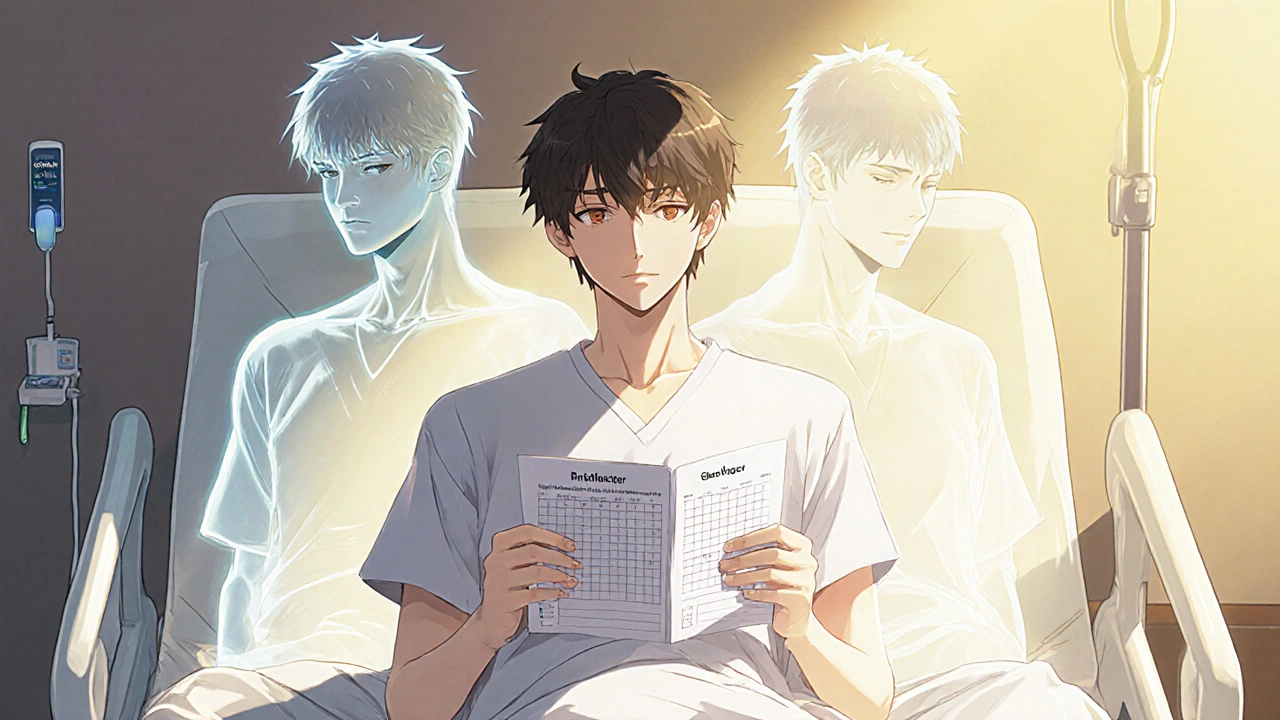
Why So Many People Get It Wrong
Here’s the real problem: Most people don’t know the difference between side effects and danger.
A 2022 study found that 31% of people stopped statins because of muscle pain. But only 5% of those cases were actual muscle damage from the drug. The rest? Probably just normal soreness or unrelated. They gave up on a life-saving heart medication because they thought the side effect was worse than the disease.
On Reddit, one thread had over 200 comments from people who quit antidepressants cold turkey. Most said they felt better after a few days. But a handful ended up in hospitals with withdrawal seizures or suicidal thoughts. The problem? They didn’t know the side effects they were fighting were temporary-and quitting fast created new ones.
And here’s the scary part: Only about 1% of serious drug reactions are ever reported to regulators. That means most warnings come too late. You can’t rely on online forums or YouTube videos. You need to talk to someone who knows your medical history.
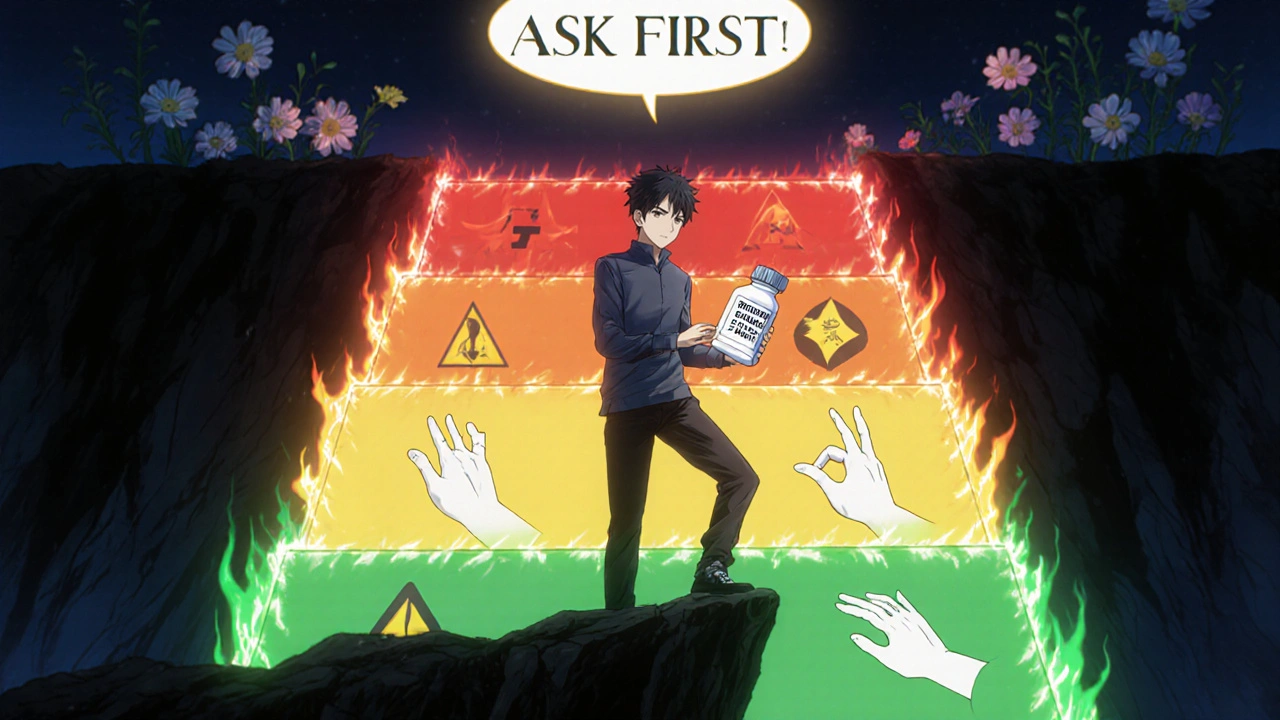
The 5-Question Decision Framework
Before you stop anything, ask yourself these five questions:
- Is this reaction life-threatening? If yes-stop now and get help.
- Is this a drug that causes withdrawal if stopped fast? If yes-don’t quit without a plan. Beta blockers, benzodiazepines, antidepressants, steroids-these all need tapering.
- Are there other options? Maybe you can switch to a different drug in the same class. Not all SSRIs cause the same side effects.
- What’s the risk of continuing vs. stopping? Is the side effect worse than the condition you’re treating? For example, is anxiety better than a heart attack?
- Do I understand what I’m doing? If you’re not sure, don’t act. Call your doctor or pharmacist. They’ve seen this before.
This framework was tested on over 1,200 patients. It worked 92% of the time. Standard care? Only 67%.
What to Do Next
If you’re having side effects:
- Write down exactly what you’re feeling, when it started, and how bad it is.
- Don’t stop any medication unless you’re sure it’s a Tier 1 reaction.
- Call your prescriber or pharmacist. Bring your list.
- Ask: “Is this a side effect I can manage-or a sign I need to stop?”
- If you’ve already stopped a drug and feel worse, get help. Withdrawal can be serious.
Medications aren’t good or bad. They’re tools. And like any tool, using them wrong can hurt you. The goal isn’t to avoid side effects at all costs. It’s to know which ones you can live with-and which ones will kill you if you ignore them.
Can I stop my medication if the side effects are annoying?
No-not without talking to your doctor first. Many side effects like nausea, dizziness, or fatigue are temporary and fade after a few weeks. Stopping abruptly can cause worse problems, like withdrawal symptoms or a return of your original condition. Always check with your provider before making a change.
What should I do if I think I’m having an allergic reaction?
If you have swelling of the face, lips, or tongue; trouble breathing; hives; or a sudden drop in blood pressure, stop the medication immediately and call emergency services. These are signs of anaphylaxis-a medical emergency. Do not wait to see if it gets better.
Why do some medications need to be tapered instead of stopped suddenly?
Your body adapts to the medication over time. Stopping suddenly can cause your system to go into shock. For example, beta blockers slow your heart; stopping fast makes it race. Antidepressants change brain chemistry; quitting cold turkey can cause brain zaps, dizziness, or anxiety. Tapering lets your body adjust slowly and safely.
Are all rashes from medications dangerous?
No. Mild rashes that are itchy but don’t blister or spread quickly are usually not dangerous. But if the rash is painful, blistering, spreading rapidly, or involves your mouth, eyes, or genitals, stop the medication and seek medical help immediately. These could be signs of Stevens-Johnson Syndrome or TEN, which are life-threatening.
I stopped my medication and now I feel worse. What do I do?
If you stopped a medication like a beta blocker, antidepressant, or steroid and now have dizziness, rapid heartbeat, severe anxiety, or nausea, contact your doctor or go to the nearest emergency room. You may be experiencing withdrawal. Don’t restart the drug on your own-get professional advice on how to safely manage it.
Can I trust online forums about stopping medications?
No. Online stories are anecdotal and often misleading. Someone might say they felt better after quitting their antidepressant-but they didn’t mention the two weeks of seizures or panic attacks that followed. Always rely on medical advice from your prescriber or pharmacist, not Reddit, Facebook, or YouTube.
How do I know if my side effect is from the drug or something else?
Track when the symptom started. Did it begin within days of starting the drug? Did it improve when you missed a dose? Did it return when you restarted? A doctor can help you connect the dots. Blood tests, symptom logs, and timing are key. Never assume a symptom is from the drug without checking.
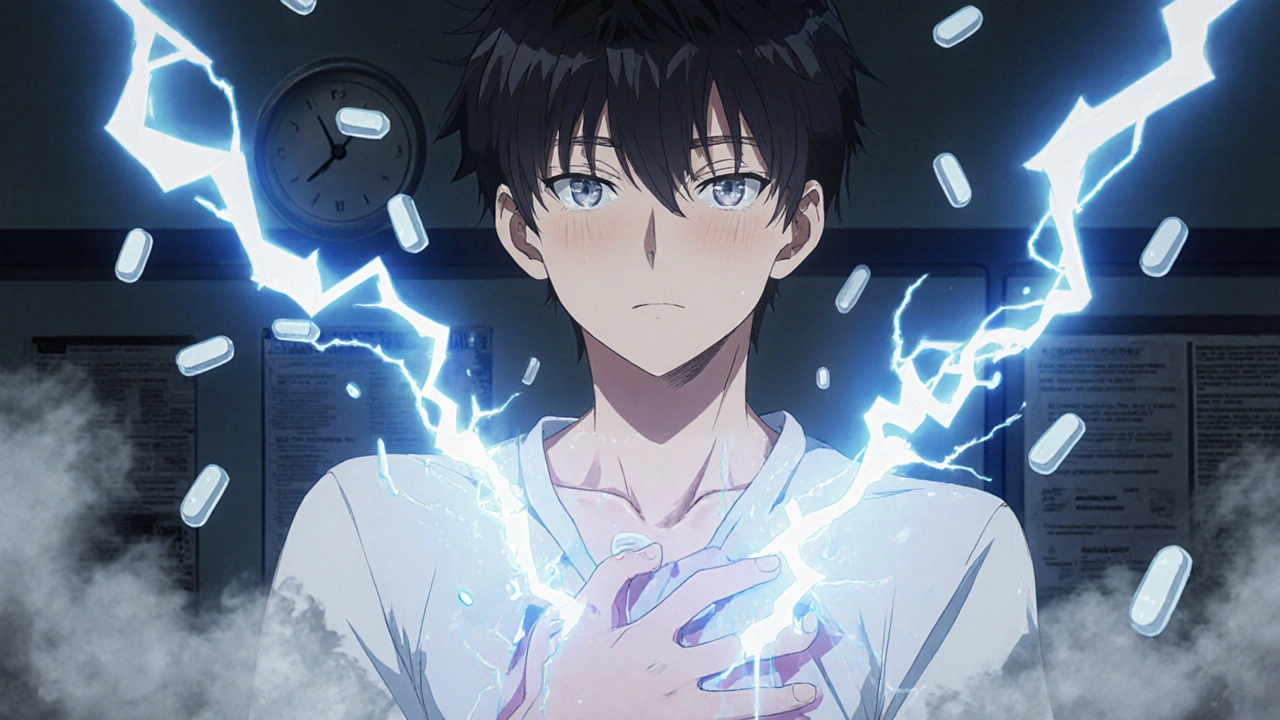
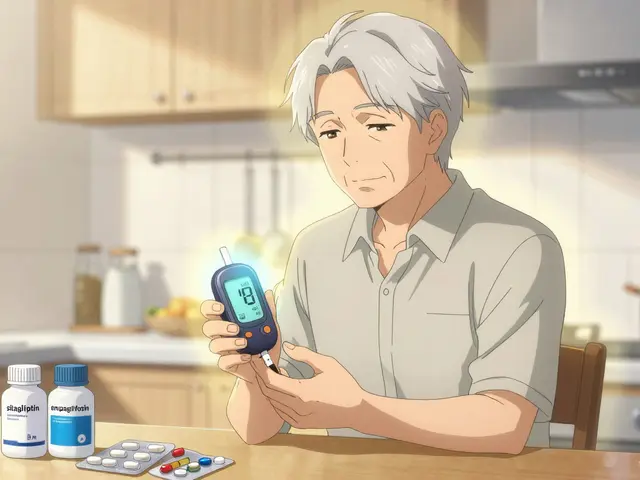

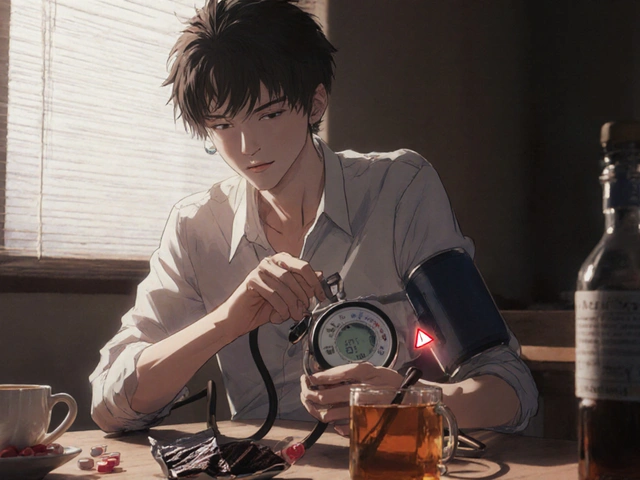
Bart Capoen
bro i stopped my zoloft cause i got dry mouth and now i’m getting brain zaps like my skull’s a taser
don’t be me
Susan Karabin
side effects aren’t the enemy the fear of discomfort is
we treat meds like they’re evil instead of tools
you wouldn’t quit lifting because your muscles hurt
but you’ll quit an antidepressant because you feel weird for two weeks
weird isn’t dangerous
dangerous is the heart attack you didn’t prevent because you quit statins cause your legs felt tired
listen to your doctor not your reddit feed
Patrick Dwyer
as a clinical pharmacist i’ve seen this too many times
patients stop clozapine because of sialorrhea and end up in psychosis rebound
or quit lamotrigine because of a mild rash and miss the window for SJS
the tier system isn’t just helpful-it’s life-saving
if you’re unsure, assume tier 3
call your prescriber before you delete the script
your body didn’t evolve to handle abrupt neurochemical shifts
neither did your liver
Christy Tomerlin
why are we even taking all these pills in the first place
big pharma wants you dependent
just eat kale and meditate
you don’t need a prescription to fix your brain
they just want you to keep buying
Lorena Cabal Lopez
lol at the 92% success rate
they tested this on patients who already trusted doctors
what about the people who got screwed by bad prescribers
what about the ones who got prescribed clonidine for anxiety and never got told about rebound hypertension
you think this is a guide
i think it’s a sales pitch with a stethoscope
STEVEN SHELLEY
HLA-B*1502 testing is a scam
they only test in Asia because they’re scared of lawsuits
in the US they just give you carbamazepine and hope you don’t die
and don’t even get me started on the FDA
they approve drugs based on corporate donations
your ‘life-saving’ tier system is just corporate propaganda wrapped in medical jargon
you think your doctor has your back
they’re on a commission from the pharmacy
ask them why they never mentioned the genetic test
they’ll change the subject
luna dream
they say anaphylaxis is rare
but what if it’s not
what if they’re hiding the real numbers
what if every time someone dies from a drug reaction
they call it ‘unrelated complications’
what if the ‘tier system’ is just to make you feel safe while they slowly poison you
they don’t want you to know
they want you to trust
and trust is the first step to control
Emil Tompkins
sooooo… you’re saying if i feel kinda weird after taking a pill
i should just… keep taking it?
what if i’m not weird
what if i’m just… awake
what if the drug is making me a zombie
and the ‘withdrawal’ is just me coming back to life
you call it ‘discontinuation syndrome’
i call it liberation
you call it ‘dangerous’
i call it freedom
and you want me to trust a chart made by people who profit when i stay on the drug
no thanks
my body knows better than your algorithm
Shilah Lala
so let me get this straight
you’re telling me i should suffer through six weeks of nausea and zero libido
because maybe, possibly, if i don’t quit
my depression might get better?
but if i quit
my brain turns into a glitchy video game
and i get electric shocks?
so… i’m supposed to choose between misery and madness?
oh wait
no choice at all
just take the pill
and thank the pharmaceutical gods
for your suffering
how poetic
Kevin Stone
you’re right to emphasize the tier system, but you’re missing the bigger picture
the real problem isn’t patient ignorance
it’s the lack of access to proper care
most people can’t get a doctor in under two weeks
and by then, they’ve already stopped the drug
and the ER doesn’t care about taper schedules
they care about triage
so yes, educate patients
but fix the system too
because no amount of tier lists helps when your only option is a 3-hour wait and a nurse who says ‘just tough it out’
Linda Patterson
you’re all being manipulated by the same people who told you vaccines were dangerous
you think this is about freedom
it’s about ignorance
and now you’re risking your life because you’d rather believe some guy on Reddit than a doctor who studied for 12 years
if you stop your meds because you’re ‘not feeling it’
you’re not brave
you’re just stupid
and if you die, don’t blame the system
blame yourself for not listening to someone who actually knows what they’re talking about
your life isn’t a TikTok trend
it’s a biological system that doesn’t care about your feelings